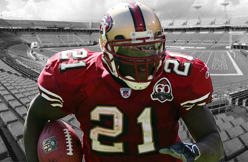NEW ORLEANS — The Miami neighborhood where Frank Gore grew up, in his words, is “small, rough.” He saw athletes he thought could truly excel, maybe play in the NFL, but opted for a different life, a more dangerous life.
So Gore decided he would do the opposite of what those guys had done, the guys who confronted him and thought they were better than him.
Despite academic difficulties, despite growing up poor — his single mother raised him, his two siblings, and her sister’s children in a tiny two-bedroom house — Gore used his football talent to get into the University of Miami.
With the Hurricanes, Gore tore his left anterior cruciate ligament in the spring of 2002, and then his right ACL in 2003.
He persevered, but the injuries, which meant he only played 28 games with the Hurricanes, made him a risky pick in the higher rounds of the 2005 NFL draft. The 49ers chose Gore in the third round, with the 65th overall pick.
Gore’s arrival in San Francisco came in the midst of the franchise’s first string of losing seasons in 25 years; over his first six seasons, not only did the 49ers not reach the playoffs, they didn’t get over .500.
But he quickly became the bright spot on what were some dismal offenses. In his second season, Gore had a franchise-record 1,695 yards.
He added 1,000-yard seasons in 2007, ’08, and ’09, the streak broken in 2010 when he fractured a hip in Week 12. But with 853 yards to that point, he was well on his way to another big season.
The statistics didn’t matter to Gore when San Francisco kept losing.
“It was real tough,” Gore said of his early seasons. “It was tough coming to work, especially for me, coming from a winning program in college. I wasn’t ever used to losing. I used to take it hard.”
It was even more frustrating when then-teammates weren’t as bothered when the losses were piling up.
“Some guys, who are not here anymore, were like ‘whatever.’ I wasn’t used to that. If we lost a game at Miami, it was like our season was over,” Gore said.
In the midst of the football losses came personal loss: Gore’s mother, Liz, died early in the 2007 season of kidney failure. A couple of months later, his close friend, Redskins safety Sean Taylor, was killed in his home.
Every time Gore scores a touchdown he points to the sky, a tribute to his mother.
“I love her,” he said this week. “She was a hard worker, and she did everything to make sure her kids [were] satisfied, and she was a smart woman.”
Finding out she had died was “like a dream, like a bad dream. It was tough.”
Gore never asked out of San Francisco, believing there were good pieces in place: himself, linebacker Patrick Willis, tight end Vernon Davis, defensive lineman Justin Smith.
All they needed was the right man to lead them.
When Gore came back from his hip injury in 2011, there was a new head coach: Jim Harbaugh. Harbaugh was able to do for the 49ers what the four head coaches who preceded him were not, lead them to a winning season and the playoffs in his first year. And now he has them in the Super Bowl, Sunday against the Ravens.
“I love it. You can get up and walk around with your head up,” Gore said of being part of a winning program again. “Everybody loves you in the city. You want to practice.”
Gore has topped 1,200 rushing yards in each of the last two seasons, with eight touchdowns each year.
When he was drafted, Gore knew he was better than the five running backs taken before him, and history has shown him to be right. Of the five — Ronnie Brown, Cedric Benson, Cadillac Williams, J.J. Arrington, and Eric Shelton — only Benson has come close to replicating Gore’s success.
Benson had three straight 1,000-yard seasons in Cincinnati; Brown and Williams only got to that benchmark once, and Arrington and Shelton were busts.
Gore is 29, nearing the time when running backs traditionally start to slow down considerably. But Gore is still the player defenses have to be ready for.
“Frank Gore runs that offense,” Baltimore defensive tackle Arthur Jones said. “He’s a hard runner, and then they change it up a little with LaMichael James. It’s up to us as a front to dominate the line of scrimmage up front and stop the run.”
After quarterback Alex Smith suffered a concussion in the ninth game of the season and Harbaugh made the decision to stick with Colin Kaepernick even after Smith was cleared to return, Gore was one of the players who spoke out in favor of Smith getting his job back.
But Gore has adjusted to the “pistol” offense the 49ers run with Kaepernick, after spending his college and NFL career up to that point in a pro-style attack. He’s enjoying it now, in part because Kaepernick’s ability to run lessens his workload.
Harbaugh counts himself among Gore’s biggest fans.
“Nobody does it better than Frank Gore, nobody,” Harbaugh said. “I have the greatest respect for Frank because he has the greatest respect for the game. It’s evidenced by how he plays, every single game, every single day. Nobody does it better than Frank Gore.”

(boston.com)



